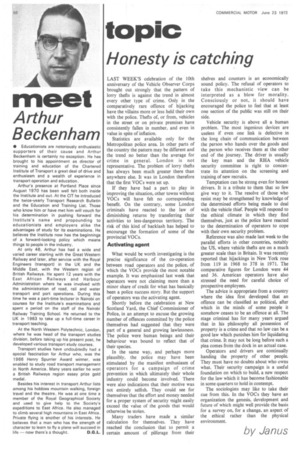topic
Page 56

If you've noticed an error in this article please click here to report it so we can fix it.
Honesty is catching
LAST WEEK'S celebration of the lath anniversary of the Vehicle Observer Corps brought out strongly that the pattern of lorry thefts is against the trend in almost every other type of crime. Only in the comparatively rare offence of hijacking have the villains more or less held their own with the police. Thefts of, or from, vehicles in the street or on private premises have consistently fallen in number, and even in value in spite of inflation.
Statistics are available only for the Metropolitan police area. In other parts of the country the pattern may be different and the trend no better than the average for crime in general. London is not representative. The problem of lorry thefts has always been much greater there than anywhere else. It was in London therefore that the first VOCs were set up.
If they have had a part to play in improving the situation, other towns without VOCs will have felt no corresponding benefit. On the contrary, some London criminals have reacted to the law of diminishing returns by transferring their activities to less-dangerous territory. The risk of this kind of backlash has helped to encourage the formation of some of the provincial VOCs.
Activating agent What would be worth investigating is the precise significance of the co-operation between road operators and the police, of which the VOCs provide the most notable example. It was emphasized last week that operators were not claiming more than a minor share of credit for what has basically been a police success story. But the support of operators was the activating agent.
Shortly before the celebration at New Scotland Yard, the Chief Commissioner of Police, in an attempt to excuse the growing number of offences committed by the police themselves had suggested that they were part of a general and growing lawlessness. The police were human beings and their behaviour was bound to reflect that of their species.
In the same way, and perhaps more plausibly, the police may have been stimulated by the manifest enthusiasm of operators for a campaign of crime prevention in which ultimately their whole industry could become involved. There were also indications that their motive was not entirely selfish. They could see for themselves that the effort and money needed for a proper system of security might easily exceed the value of the goods that would otherwise be stolen.
Many traders have made a similar calculation for themselves. They have reached the conclusion that to permit a certain amount of pilferage from their shelves and counters is an economically sound policy. The refusal of operators to take this mechanistic view can be interpreted as a blow for morality. Consciously or not, it should have encouraged the police to feel that at least one section of the public was still on their side.
Vehicle security is above all a human problem. The most ingenious devices are useless if even one link is defective in the long chain of communication between the person who hands over the goods and the person who receives them at the other end of the journey. The driver is usually the key man and the RHA vehicle security committee is right to concentrate its attention on the screening and training of new recruits.
Temptation can be strong even for honest drivers. It is a tribute to them that so few give way to it. The resolve of those who resist may be strengthened by knowledge of the determined efforts being made to deal with the vehicle thief. People will respond to the ethical climate in which they find themselves, just as the police have reacted to the determination of operators to cope with their own security problem.
Reference was also made last week to the parallel efforts in other countries, notably the US, where vehicle thefts are on a much greater scale than in Britain. It was recently reported that hijackings in New York rose from 119 in 1968 to 378 in 1971. The comparative figures for London were 44 and 36. American operators have also stressed the need for careful choice of prospective employees.
The advice is appropriate from a country where the idea first developed that an offence can be classified •as political, after which in the minds of some people it somehow ceases to be an offence at all. The stage criminal has for many years argued that in his philosophy all possession of property is a crime and that no law can be a good law which punishes him for liquidating that crime. It may not be long before such a plea comes from the dock in an actual case.
Operators and drivers are continually handing the property of other people. They must have no doubts about who owns what. Their security campaign is a useful foundation on which to build, a new respect for the law which it has become fashionable in some quarters to hold in contempt.
The sociologists may like to take their cue from this. In the VOCs they have an organization the genesis, development and future of which might well provide the basis for a survey on, for a change, an aspect of the ethical rather than the physical environment.
by Janus












































































































